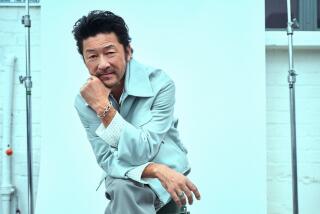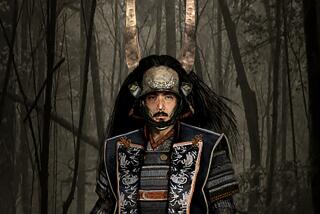Hip-Hop’s Musical Sensibility Fits ‘Dog’
- Share via
Infusing “Ghost Dog: The Way of the Samurai” with the essence of hip-hop, writer-director Jim Jarmusch has freely reworked ideas and borrowed symbols from a wide range of movies.
References from karate flicks to westerns and everything in between appear throughout the Artisan Entertainment film, which opens nationally today. Still, the project, which stars Forest Whitaker in the title role as a stoic hit man, is difficult to classify.
“ ‘Ghost Dog’ is a mixture of a lot of things, almost a collage,” says Jarmusch, who has also directed “Year of the Horse” and “Dead Man.” “It isn’t a gangster or a samurai or a western or a hip-hop or an action film, but it has references to all those things.”
That blurred line of classification and the eclectic cinematic references give “Ghost Dog” a decidedly hip-hop edge, and the film was scored by the RZA, a premier hip-hop producer. The Staten Island, N.Y., artist joins fellow rappers-producers Wyclef Jean (who scored “Life,” which starred Eddie Murphy and Martin Lawrence) and Schoolly D (who scored a number of Abel Ferrara’s films) in the growing ranks of hip-hop musicians being hired to score films.
Although hip-hop artists are often criticized for using the work of others in their material, Whitaker says that a blend of musical styles, specifically from a hip-hop perspective, had to be used in order for “Ghost Dog” to have a score that effectively follows its plot.
“The style of the movie is hip-hop,” Whitaker says. “Because of the way [Jarmusch] references these other movies, it has to be hip-hop. That’s what he does throughout the movie, he’s sampling pieces of other things. The movie is designed like a rap song, where it would borrow something from another source. It’s very simple, because at its core it’s all about the eternal. That’s why it’s so” minimalistic.
Jarmusch became a fan of the RZA in 1993, when the Wu-Tang Clan, a group the RZA produces and raps for, released its debut album. The RZA’s use of sound bites from kung fu movies as well as the sometimes awkward feel to his music captivated Jarmusch. In his lyrics, the RZA, as well as other members of the Clan, has regularly incorporated Eastern philosophies and referred to ancient Eastern texts.
As a man who relies on music when developing a script, Jarmusch felt that hip-hop and the RZA would be essential to a film that would pay homage to so many sources and would be presented as a mosaic of thought.
“Before I start writing a script, I listen to a lot of music and I home in on a lot of music that is feeding my imagination for the particular atmosphere I’m trying to get to,” he says. “I was listening to certain jazz and a lot of early dub stuff, but I was listening to the RZA’s instrumentals and they were really inspiring me. It was like--yeah, this music is really opening up my imagination to a certain rhythm of images that were just in the stage of being imagined. It just was working for me. It seemed appropriate.
“RZA’s music is very evocative, very cinematic to me,” Jarmusch continues. “It opens up my imagination to certain atmospheric things that are not necessarily contained in the music but [that] make your mind open to things. To me, RZA makes little films with music.”
Jarmusch and the RZA met before Jarmusch started shooting the film. They discussed sonic ideas and themes for the score, but the first batch of music the RZA gave the director sounded too much like a traditional score for this nontraditional movie. It didn’t fit with the RZA’s signature, “damaged” sound, and it certainly didn’t jibe with Jarmusch’s vision.
The original music failed to embody the hip-hop sensibility of Ghost Dog, a character who wears cornrows, sports military gear and wears a thick chain around his neck much like many hip-hop aficionados. Ghost Dog also shares another common thread with the hip-hop community: his respect for the mob. He works for the mob, which has been idolized on a number of songs by a variety of hip-hop artists.
With a clearer understanding of Jarmusch’s intent, the RZA produced a new set of music for the film. This new music, for the most part, is lean, drum-driven work, both simple and powerful, like much of the RZA’s better material. It serves as a suitable backdrop for the seemingly hip-hop Ghost Dog character.
In addition to the appropriate musical score, the actor portraying the main character had to fit into Jarmusch’s vision. After several meetings with Whitaker, Jarmusch molded Ghost Dog with Whitaker firmly in mind.
“I’m attracted to actors who don’t act out the intention of a scene on screen,” Jarmusch says. “I really get annoyed when they have to theatrically telegraph to you immediately what this means. I like actors that become a character and then in the world of the film, they’re in certain situations in which they just react as that person. I find that believable. Forest is a classic example of an actor who understands that. You can use very little and say a lot more.”
This approach is consistent with the less-is-more philosophy hip-hop artists employ.
“Paying homage to the tribe of the urban environment and the hip-hop environment, it’s very important to this character being believable,” says Whitaker, who meditated at least two hours a day in preparation for playing the highly disciplined character. “The drum beats and the sounds and the way they do things in the hip-hop music world are a way to establish the environment he encapsulates himself in. The music is a deep part of the character in the movie.”
Keeping with the code of the samurai and the bare-bones approach hip-hop artists normally take with their music, Ghost Dog limits his words and deeds. He is very loyal to his master--a mobster who saved his life--and remains true to a certain philosophy that he’s chosen, even though he understands that it is a destructive system.
Even as the mob’s family code deteriorates during the course the film, Ghost Dog remains focused in his beliefs, and the hard-hitting music accompanying him attests to his resilience.
“The music sat in the environment,” the RZA says. “I could have come wilder, but I kept it to Ghost Dog. He’s a very internal character and there’s a lot of scenes where you’re just looking at him thinking, where you kind of feel his thoughts. I wanted the music to catch that.”
Jarmusch adds: “We really wanted it to be integrated into the fabric of the film and not slapped on the surface. These things were meaningful to us while making the film and they reflected and echoed certain things in the film.
“My films have always been very musical in that they’re very attentive to the rhythm of the film, the story, the editing, the way people move,” Jarmusch continues. “It’s not just the conventional ‘power cut,’ where the scene’s over and ‘cut.’ That doesn’t appeal to me because in real life things don’t work that way. Sometimes the lingering aftereffect of an emotional moment will have more in it than that more dramatic moment itself has. RZA understands that in his music.”
Even silence is used as “music,” a tactic the RZA says was influenced by old samurai movies. The music fits the moment of the film. Whether by alluding to other films or by incorporating a variety of musical forms into the score, “Ghost Dog: The Way of the Samurai” gives a nod of appreciation to the hip-hop sensibility.
Jarmusch says the movie, like the music, should be considered a tribute to older work, not a rip-off. “The film is an attempt to give respect to where things come from, in terms of genres,” he says, “but [to also] try to weave something that’s new out of it.”
More to Read
Only good movies
Get the Indie Focus newsletter, Mark Olsen's weekly guide to the world of cinema.
You may occasionally receive promotional content from the Los Angeles Times.








